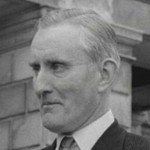 James Chichester-Clark (1923-2002) was an Ulster Unionist Party (UUP) politician and the second-last prime minister of Northern Ireland. He led Northern Ireland during the first two years of the Troubles and among other policies was responsible for the deployment of British troops there. Chichester-Clark was born in Castledawson, halfway between Belfast and Derry. The son of a prominent Protestant politician and a cousin to Terence O’Neill, Chichester-Clark was educated at English public schools Selwyn House and Eton. He received a commission into the Irish Guards, served in World War II and remained a career soldier. Chichester-Clark retired from the army with the rank of major. In 1960 he was elected to the Northern Ireland parliament, representing the seat of South Derry. He held a number of positions during the 1960s, including UUP party whip, leader of the Commons and agriculture minister.
James Chichester-Clark (1923-2002) was an Ulster Unionist Party (UUP) politician and the second-last prime minister of Northern Ireland. He led Northern Ireland during the first two years of the Troubles and among other policies was responsible for the deployment of British troops there. Chichester-Clark was born in Castledawson, halfway between Belfast and Derry. The son of a prominent Protestant politician and a cousin to Terence O’Neill, Chichester-Clark was educated at English public schools Selwyn House and Eton. He received a commission into the Irish Guards, served in World War II and remained a career soldier. Chichester-Clark retired from the army with the rank of major. In 1960 he was elected to the Northern Ireland parliament, representing the seat of South Derry. He held a number of positions during the 1960s, including UUP party whip, leader of the Commons and agriculture minister.
In April 1969 Chichester-Clark resigned from the ministry in protest against O’Neill’s electoral reforms. This resignation, interpreted as a sign of party division, precipitated O’Neill’s resignation as prime minister. The following month Chichester-Clark won a leadership ballot, becoming UUP leader and the fifth prime minister of Northern Ireland. Like his predecessor Chichester-Clark found himself facing growing civil disorder and wedged between radicals on both sides. The outbreak of rioting and violence in Bogside (August 1969) led to him requesting an intervention by British soldiers. British involvement only inflamed the unrest in Northern Ireland, encouraged the growth of paramilitary groups and undermined Chichester-Clark’s authority. As violence worsened the prime minister came under attack from conservative Unionists, most notably Ian Paisley, for failing to crush the Provisional Irish Republican Army (IRA).
In March 1971 Chichester-Clark requested the deployment of a regiment of British troops to respond to Republican paramilitary attacks; he also lobbied for the Northern Ireland government to have operational control of these troops. British prime minister Edward Heath refused his request and Chichester-Clark resigned in March 1971. He was replaced by Brian Faulkner. After his resignation Chichester-Clark was made a life peer, becoming Baron Moyola of Castledown. He lived quietly in retirement, dying in May 2002 at the age of 79.
© Alpha History 2017. Content on this page may not be republished or distributed without permission. For more information please refer to our Terms of Use.
This page was written by Rebekah Poole and Jennifer Llewellyn. To reference this page, use the following citation:
R. Poole & J. Llewellyn, “James Chichester-Clark”, Alpha History, accessed [today’s date], https://alphahistory.com/northernireland/james-chichester-clark/.
